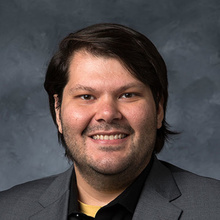
From the Office of the Vice President for Research
Joe Gomes, a University of Iowa assistant professor of chemical and biochemical engineering and an Iowa Technology Institute faculty affiliate, is a co-principal investigator on a team awarded a Jumpstarting Tomorrow Initiative grant to start a quantum simulation (QSim) program.
The team also includes principal investigator Ravitej Uppu, assistant professor of physics and astronomy, and fellow co-principal investigators Aditi Bhattacherjee, assistant professor of chemistry, and Xueyu Zhu, assistant professor of mathematics.
The team was among five across the UI awarded $150,000 each to explore potential future strategic research investments by the university.
Leslie Revaux
Office of the Vice President for Research
Five University of Iowa research teams were awarded funds in round one of the Jumpstarting Tomorrow initiative. The new pilot grant and community-building program supports innovative and collaborative research teams.
Each of the research teams received $150,000 to explore potential future strategic research investments by the university. The funding was made possible through $2 million in funding to the Research Development Office from the first round of disbursements related to the UI utility public-private partnership (P3).
“These Jumpstarting Tomorrow projects will investigate unique societal challenges from a variety of disciplinary perspectives,” said Marty Scholtz, vice president for research. “Our goal with this funding is to allow researchers to break out of silos and explore ideas that are only possible through interdisciplinary collaboration.”
The approved projects are:
Addressing Health Disparities and Biases in AI and Machine Learning Tools
Led by Associate Professor of Electrical and Computer Engineering, Guadalupe Canahuate, the research team seeks to identify and quantify current biases in artificial intelligence (AI) and machine learning (ML) healthcare models and to develop interventions to correct and reduce these biases. “Because AI/ML models learn from historically collected data, human and structural biases present in the data can be perpetuated and even exacerbated as the models are applied to clinical care,” said Canahuate. The research team includes Thomas Casavant, professor, biomedical engineering; Mary Charlton, associate professor, epidemiology; and John Buatti, professor and chair, radiation oncology.
Decarb 2040 – Positioning Iowa as an Energy Exporter in the Coming Era of Deep Decarbonization
By combining their expertise in engineering, data science, public policy, environmental science, and business, the research team will investigate how Iowa can become a net exporter of energy by 2040. “Iowa’s abundant wind, bioenergy and solar resources make it a strong player in the emerging green energy landscape,” the project’s principal investigator, Charles Stanier, professor, chemical and biochemical engineering. The project team includes Jerry Anthony, associate professor, urban and regional planning; Marc Linderman, associate professor, geography and sustainability sciences; and Wei Li, associate professor, finance.
Iowa Initiative for Scientific Imaging and Conservation of Cultural Artifacts
This project, which blends humanities, sciences, and engineering, brings together UI faculty and staff researchers from across the campus to develop non-destructive digital imaging, machine learning, and artificial intelligence (AI) technologies to study cultural artifacts. “Iowa is well known for its medical imaging research. In this project, 3D medical X-ray scanners and quantitative image analysis methods are repurposed to study internals of cultural artifacts or read pages of unopened medieval books. The use of state-of-the-art medical research equipment for studies of precious, fragile, unique, one-of-a-kind cultural artifacts shows the interdisciplinary strength of our faculty and students,” said the project’s principal investigator, Milan Sonka, professor of electrical and computer engineering. Co-investigators on the project are Paul Dilley, associate professor, classics; Daniel Maze, assistant professor, art history; Thaddeus Wadas, associate professor, radiology, and Katherine Tachau, professor emerita, history.
Jumpstarting a Quantum Simulation (QSim) Program at The University of Iowa
“Quantum simulation can enable efficient discovery of drugs, biocompatible fertilizers, and high-temperature superconductors, all key priorities as identified by the United Nations,” said principal investigator Ravitej Uppu, assistant professor, physics and astronomy. “Unfortunately, the cost and scalability of superconducting quantum simulators limits their application.” This proposal aims to solve the problem of constructing a practical QSim by bringing together physicists, chemists, engineers, and mathematicians to concurrently tackle the fundamental as well as technical challenges. Co-principal investigators on the project are Aditi Bhattacherjee, assistant professor, chemistry; Joe Gomes, assistant professor, chemical and biochemical engineering; Xueyu Zhu, assistant professor, mathematics.
Public Libraries for Disaster Resilience: Assessing Libraries’ Community Impacts in Times of Climate and Socio-Economic Crises
The interdisciplinary research team will assess how public libraries mitigate community vulnerabilities and build resilience to climate, social, and economic risks. “Libraries provide welcoming spaces and essential services during crises: shelter from extreme weather for the poor and homeless, internet access, job search and training during economic recessions, and reliable information during crises, such as the COVID-19 pandemic,” said principal investigator Lucie Laurian, professor and director, school of planning and public affairs. Co-principal investigators on the project are Iulian Vamanu, assistant professor, school of library and information science; Jennifer Glanville, professor and department chair, sociology and criminology; Phuong Nguyen, associate professor, school of planning and public affairs; Haifeng Qian, associate professor, school of planning and public affairs; Kang Zhao, associate professor, business analytics.
All awardees will participate in a Jumpstarting Tomorrow symposium in fall 2022. The symposium will provide an additional engagement opportunity and showcase the teams, communities, and outcomes from the program.
A request for proposals for a second round of funding will be issued in fall of 2021. Details will be posted on the initiative’s webpage.
The UI Research Development Office is part of the University of Iowa Office of the Vice President for Research, which provides researchers and scholars with resources, guidance, and inspiration to secure funding, collaborate, innovate, and forge frontiers of discovery that benefit everyone. More at http://research.uiowa.edu, and on Twitter: @DaretoDiscover
Contacts:
Aaron Kline, Director, Research Development Office, 319-335-4142
